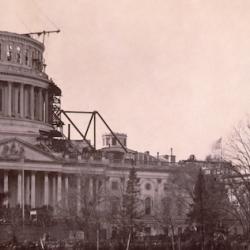No American needs to be told that it’s been a tumultuous, often bewildering, political season. Democrats were rocked from the left by an aging socialist; the GOP has been taken over by a politically inexperienced showman. Clearly, the natives are restless.
About what? What do Trump supporters want? What were Bernie’s troops protesting? Why is everyone so alienated from the political leadership?
Ross Douthat hit on a key element of the cross-party protest with his typology of post-liberalisms. Douthat focused on anti- or post-liberal intellectuals—new radicals like Thomas Pikkety and Naomi Klein; new reactionaries like Michel Houellebeecq; and religious dissenters, some of whom proclaim the “social kingship of Jesus,” a gospel that Douthat rightly sees, “attacks the modern liberal order at the root.” But he also noted that some of these same instincts are on display on a larger scale in the Presidential election.
Douthat’s analysis highlights the similarity between the movements Trump and Sanders started. It’s true but superficial to say that they’re united in angry frustration about the political status quo. The similarity is more fundamental, and so is the protest. They’re not simply objecting to this or that policy, or even a policy orientation. It’s a protest against political and media elites, but even that doesn’t get to the base line of protest. Trump and Sanders appeal to voters who are united in the conviction that something is structurally, systemically amiss with American political society.
It’s equally important, though, to ask what these protestors are for. Trump calls it “American greatness,” but we can perhaps we more specific. The Trumpist protest targets what has become a tyrannical multiculturalism, the demand for recognition of the other that, in Levinasian fashion, cannot stop short of self-annihilation. What Trump supporters want is a political system devoted to America. They believe there is such a thing as “America,” such a thing as the “American way of life,” and they believe these are goods worth defending and preserving.
They want to curb immigration not because they’re ungenerous or because they hate people with darker skin, but because they’re suspicious that many recent immigrants don’t share American values. They worry that the malaise of the American economy will make it impossible for us to sustain the way of life we’ve become accustomed to. (This is all admittedly an oversimplification, and an intentionally charitable one.)
If we step back a few paces, ratchet up the abstraction even further, we might see this: Though few are likely to put it this way, the protest is against bureaucratic, managerial politics. It’s a protest against the purely formal, technocratic conception of politics that dominates contemporary liberal order. Positively, it’s agitation for the restoration of American purpose and the protection of an American way of life. Trumpism seeks a teleological politics, a politics not of means but of ends.
That might be a sign not of the demise of American democracy but of its health. It’s a sign that Americans in large numbers have recognized the poverty of liberal order and want something more. What they’re looking for isn’t the technical tinkering that Clinton has so obviously mastered; they want vision and purpose and national meaning. 2016 looks like a variation on the passions of Obama’s first candidacy, when Americans voted for Big Ideas.
Now, assuming that’s close to accurate, a few points of reflection. First, there are several levels of irony in making Trump a focal point for a protest against liberalism and agitation for a renewal of American identity. Bureaucratic governance is theoretically amoral; the genius of the system is that you don’t have to find good people to man the controls. A protest against liberalism should be a protest in favor of virtuous leaders. Even Trump’s supporters acknowledge that Trump doesn’t quite fit this bill (“we’re not electing a Sunday School teacher”). The deeper irony is that Trumpism is a political movement seeking to restore American purpose through a Presidential election. It may be a protest against liberalism, but it betrays the same confidence in electoral politics that got us where we are.
Second, Trumpism advocates a politics of ends, and the end (as stated) is to make America great. We might ask, Why make America great again? And the answer is murky at best. American greatness seems a sufficient end in itself. When we reach that point, Trumpist anti-liberalism has come full circle back to liberalism, for which there can be no ultimate political end beyond the perpetuation of liberalism itself. And the self-referential nationalism of Trumpism bears enough family resemblance to the fascisms of the twentieth century to set off a warning bell. Love of country isn’t cause for worry; love for country becomes dangerous when it is not enclosed within and checked by some higher purpose.
Finally, most forms of anti-liberalism end at a similar impasse. To transcend liberalism, one needs, well, transcendence. An effective anti-liberalism has to break open liberalism’s self-enclosure. In Douthat’s typology, it’s only the religious anti-liberals who can do that. “Jesus is King; kiss His feet” strikes at the root in a way that “Make America Great Again” and “Feel the Bern” do not.
And that implies that a truly post-liberal politics will require a dramatic change of stance, strategy, and tactics among American Christians. Instead of positioning ourselves along the political spectrum, we need to regard America and its politics as a field of mission, to assess our cultural and economic challenges as opportunities for ministry, to pursue America’s good not fundamentally for America’s sake but for the contribution that our country can make to the reign of God.











